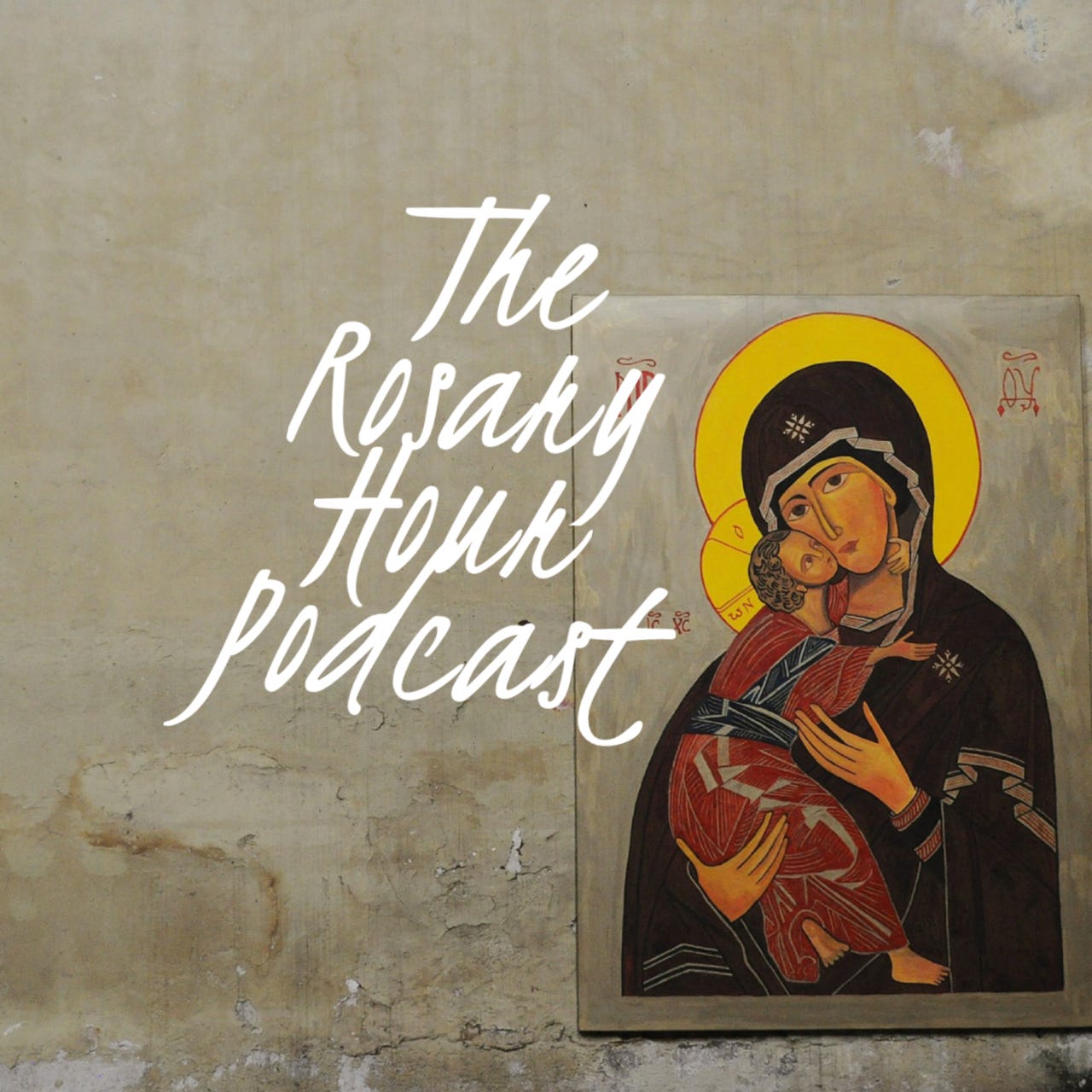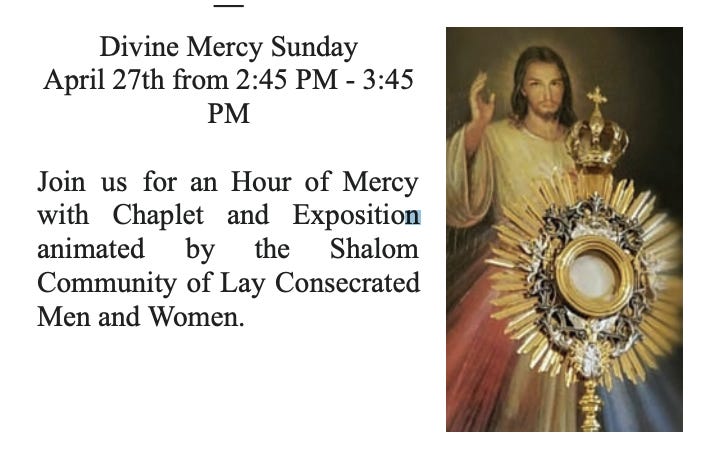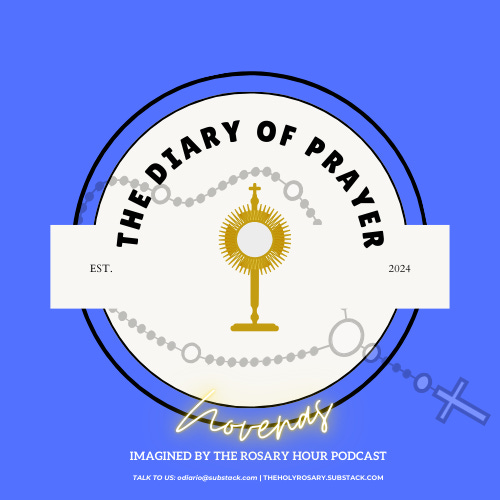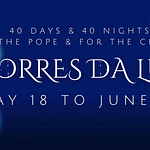PRAY THE CHAPLET TO THE DIVINE MERCY NOVENA STARTING TODAY!
GOOD FRIDAY AFTER THOUGHTS
To those who are called, to those who are dear to God the Father and kept safe for Jesus Christ: we wish you all mercy and peace and love.
In today’s broadcast, you can pray the entire Chaplet to the Divine Mercy with Asher and Amelia from their Live Record session last year. Just scroll to minute 3:23 to begin.
We invite you to review Fr. Anthony Gramlich’s past video on “Mercy is God’s Greatest Attribute” on our Rosary YouTube Channel (click here)1, and to watch “On the Meaning of Mercy” by Fr. Seraphim Michalenko, MIC “the world-renowned expert on the life and spirituality of St. Faustina — the man who smuggled photographic images of the pages of St. Faustina’s Diary out of Communist-occupied Poland in the 1970s and later documented her beatification and canonization miracles”.
“WHEN MERCY SEASONS JUSTICE”
In the above catechism on Divine Mercy video, Fr. Seraphim cites William Shakespeare (1564–1616) from The Merchant of Venice, Act IV, Scene I from “The quality of mercy is not strained” speech in which Portia makes the plea for mercy:
The quality of mercy is not strained;
It droppeth as the gentle rain from heaven
Upon the place beneath. It is twice blest;
It blesseth him that gives and him that takes:
'T is mightiest in the mightiest; it becomes
The throned monarch better than his crown:
His sceptre shows the force of temporal power,
The attribute to awe and majesty,
Wherein doth sit the dread and fear of kings;
But mercy is above this sceptred sway;
It is enthronèd in the hearts of kings,
It is an attribute to God himself;
And earthly power doth then show likest God's
When mercy seasons justice.2
WHY DO WE PRAY THE CHAPLET TO THE DIVINE MERCY?
In his article explaining the Chaplet to the Divine Mercy, in response to questions asked, Dr. Robert Stackpole explains the words of the Chaplet in two parts.
Part 1 can be read here and we’ve noted the segments for educational use purposes only. Dr. Stackpole states in his online article for the National Shrine of the Divine Mercy entitled “A Walk Through the Words of the Chaplet” published on Oct, 22, 2019 that “the Chaplet begins with the words”:
1. "Eternal Father"
DR. STACKPOLE states:
“Notice that we are addressing the Lord as "Father," the same way that He is addressed in the Eucharistic Prayer at every Mass. We do not address Him just in the abstract, as "God," or "Supreme Being," but as the loving Father that Jesus Christ revealed Him to be, "the Father rich in mercy" (Eph 2:4). The Chaplet, therefore, brings us into God's presence in the same way that the Lord's Prayer does: as our "Father."
We also call Him "Eternal" Father here. Why don't we start by calling Him "Almighty Father," or "Heavenly Father," or even "Merciful Father"? Why focus on His "eternity"?
There is a special reason for the focus on His eternal, divine nature here, for God's "eternity" means that every moment of time is always present before Him. He sees with His infinite intellect all the past, all the present, and all the future, always before His gaze. What the Father sees from all eternity, therefore, includes the life, agony and passion of His beloved Son. In other words, the Father has ever before His eyes (so to speak) His Son's perfect offering and sacrifice for sins. He also sees all the Masses all over the world in which the Church pleads, in Christ and with Christ, that all the graces He won for us by His sacrificial life and death may be poured out upon the world.
It is only because God is our "eternal" Father, who has all these things ever before His gaze, that we can confidently state the second line of the Chaplet:
2. "I offer You the Body and Blood, Soul and Divinity
of Your dearly beloved Son, our Lord Jesus Christ"
DR. STACKPOLE expands:
’Notice that what we here "offer" to the Father is what He sees from all eternity: the self-offering and self-sacrifice of His Son. We "offer" this to Him in the sense that we pray all our Chaplets to the Father solely on the basis of what is most precious to Him in the whole universe. Namely, the loving obedience unto death of Jesus His Son.
So, we "offer" Christ's sacrifice to the Father in the sense that all our pleas to the Father for an outpouring of His mercy upon the world are made solely on the basis of Christ's perfect sacrifice to the Father, with all its superabundant merits, and we pray that all the graces that Jesus merited for us by His life and death may be poured out upon us.
In this way, also, we join our Chaplet prayers on earth with the pleading of the heavenly Jesus Christ, who continues forever in heaven as our "advocate" and "intercessor":
If any one does sin, we have an advocate with the Father, Jesus Christ the righteous, and He is the expiation for our sins, and not for ours only, but for the sins of the whole world (1 Jn 2:1).
[Christ] hold His priesthood permanently because He continues forever. Consequently, He is able for all time to save those who draw near to God through Him, since He always lives to make intercession for them (Heb 7:25).’
Dr. Stackpole continues:
Most importantly, you will recognize that all this is precisely the same thing that happens at every Mass. Catechism 1374, quoting the 16th century ecumenical Council of Trent, states:
"In the Most Blessed Sacrament of the Eucharist, the Body and Blood, together with the Soul and Divinity of our Lord Jesus Christ, and therefore the whole Christ, is truly, really, and substantially contained."
In an answer to a question, the theologian continues:
This is the answer to your particular question, John. Trent was responding to those Protestant critics at the time who misconstrued the Catholic doctrine of the Real Presence, as if it meant that we receive merely the material elements of Jesus' Body and Blood. Whereas Catholic belief is that those words are just "shorthand" for the fullness of the Eucharistic mystery: that we receive the living and glorified Body and Blood of our heavenly Advocate and Intercessor, Jesus Christ, in every Holy Communion. For a living body is a body united to its soul, and a glorified human being is a body and soul united with divinity. Therefore, in the Eucharist we receive and enjoy an intimate and deeply personal relationship with Jesus Christ in the fullness of all that He is, and we unite ourselves completely with His earthly sacrifice and heavenly pleading on our behalf.
The Council of Trent also taught that by offering Christ to the Father in the Eucharist (that is, by offering our prayers in union with His sacrifice and prayers to the Father) we make a truly "propitiatory" offering for our sins. In other words, an offering that covers and makes up for the debt to God's justice that we incurred by our sins. Similarly, in the Chaplet, we extend this same Eucharistic offering: We offer up the whole Christ, Body and Blood, Soul and Divinity, as the next line says ...
Dr. Stackpole then adds notes on the third part of the prayer —
3. " ... in atonement for our sins, and those of the whole world."
"Atonement" literally means "at-one-ment."
The Eucharist re-unites us with God, makes us "one" with Him, re-establishing our friendship with Him by removing the barriers to union with God. The principal barrier, of course, are our sins, and the "debt" to divine justice that we owe to God because of our sins. This debt is fully compensated, blotted out, wiped away (or, to use more technical, theological language: expiated, propitiated, and satisfied) by the Son of God's perfect sacrifice in His perfect life and death for us, made present to us, and offered up to the Father, at every Mass. Thus, whenever we say the Chaplet, we are, in a sense, extending that same Eucharistic offering-prayer. We are prayerfully offering up the infinite value and merit of the Son of God's perfect sacrifice to the Father, uniting to that sacrifice our own intercessory intentions.
The secret of the Chaplet, therefore, is that it flows directly from the Eucharist. It is an intercessory prayer that extends the Eucharistic offering of Jesus Christ (that is, it is an intercessory prayer made explicitly on the basis of Jesus Christ's sacrificial life and death, and heavenly pleading for us, made present to us at every Mass), and it applies the blessings of that Eucharistic sacrifice to the needs of the world, as much as such devout supplications at Mass can do.
Stackpole’s article continues in response to a question asked:
The Chaplet is not really "as if you were receiving Communion." The bread and wine can only be consecrated and transubstantiated, becoming the Real Presence of Jesus Christ, at Holy Mass itself, and we can only receive Him in the fullness of His Eucharistic presence by going to Mass and receiving the Sacred Host. So the Chaplet is certainly no substitute for going to the Eucharist, nor the equivalent of receiving Holy Communion. But the Chaplet is more like an echo that does not die away of all the supplications and intercessory prayers we say at Mass, as if those prayers at Mass - that offering of Christ to the Father and that pleading for all the benefits of His sacrifice to be poured out upon us - were part of a liturgy that never ceases here on earth, wherever devout and faithful souls continue to pray the Chaplet ...
Up next: Dr. Stackpole explains in PART II: "For the sake of His sorrowful Passion" in the following link:
https://www.thedivinemercy.org/articles/walk-through-words-chaplet-part-ii
Learn with Amelia and Asher how to pray the Chaplet to the Divine Mercy today in the preview copy of our upcoming Rosary Channel chapter for our ongoing conference on suffering.
HOW TO PRAY THE NOVENA TO THE DIVINE MERCY | QUICK REVIEW
In the above video, Fr. Chris Alar, Provincial Superior of the Marians of the Immaculate Conception — the custodians of the Message of Divine Mercy, the Image of Divine Mercy, and the Diary of St. Faustina — notes that:
“But since we are human, it may be hard sometimes for us to believe that God could love us this much.
And it is precisely because we think and feel this way that Jesus established this new devotion to Divine Mercy.”
He continues:
“You know, the promises Jesus made through this Novenas, the Novena of Divine Mercy are astounding. He promised, quote, by this nine of chaplets, I will grant every possible grace to souls.
This means Jesus’s promise of special graces was not made just in regard to these nine intentions of the Divine Mercy.
His promise was also in regard to the recitation of chaplets for any intention we may have that means when we pray the chaplet of Divine Mercy for nine consecutive days in the form of a novena, our intentions will have special power before the throne of God.”
CONSOLE THE SACRED HEART OF JESUS ON GOOD FRIDAY
“HE LOVED US”, Saint Paul says of Christ (cf. Rom 8:37), in order to make us realize that nothing can ever “separate us” from that love (Rom 8:39) starts Pope Francis as he begins Dilexit Nos, Which listeners can hear as Chapter 13 in the following link.
THE GRACES OF GOOD FRIDAY | AN EXERCISE OF SILENCE
Padre Pio’s perspective on Good Friday and the value of silence, fasting, and forgiveness on this day appeared in a video released today and which shares some helpful tips to create a “framework” for Good Friday.
Below, we’ve provided a short transcript summarizing the video’s key messages (for busy people) — adding a few developed recommendations that include our online resources to help you explain to others the “why” behind this Solemn Day in the Liturgical calendar:
Good Friday can begin and even end with a time of intentional silence - which can be true on any Friday of the year:
If possible, disconnect from everything during a period of time that your state in life allows, and try withdrawing to a quiet space (a chapel in your home, or go to the Church early).
Take a crucifix, your Rosary, a sacred image during these sacred hours when Christ hung on the cross: “Heaven speaks most clearly to the listening heart”.
Conduct a prayerful reading of John 19: The passion narrative.
“Read slowly”… “pausing to visualize each scene”. “Don't rush through the familiar words. Let them wash over you anew, as if hearing them for the first time”.
“Imagine standing with Mary at the foot of the cross, experiencing each moment through her Immaculate Heart.” RHP: ANNOTATION — Try to unite yourself with Our Lady of Sorrows, Our Lady of Tears and pray the Sorrowful Mysteries.
At the 3 O’Clock Hour Hour of Mercy: A practice for every day of the year
Before retiring, try to start the the Chaplet to Divine Mercy Novena, uniting yourself with the hour of Christ's death: "This powerful prayer revealed to Saint Faustina, taps into the ocean of mercy that burst forth from Christ's heart when the soldiers's lance pierced his side.”
The video further encourages that one engage in a spiritual exercise that might be called a “forgiveness prayer” in which you take a piece of paper and write down who you need to forgive: “It might be someone who deeply wounded you or perhaps yourself for past failures”
RHP: Hold this paper as you pray, the 5th Sorrowful Mystery (which we’ll post soon) and/or the Chaplet.
Then the video suggests praying in this way:
“Lord Jesus, as you forgave from your cross, I now choose to forgive, not because it's easy, but because you've shown me the way, afterward, tear up or safely burn the paper, symbolically releasing the debt to God's mercy.
The video does not mention going to the Holy Sacrifice of the Mass.
If possible, pray to the Stations of the Cross, even next Friday in the 12-3 p.m. block on a chosen set of days such as First Friday for the remainder of the year. Outside of Lent, the Stations of the Cross are sometimes often offered by parishes at 2 p.m. or in the evening prior to the First Friday Mass. One could also pray the 15 prayers of St. Bridget of Sweden as a Way of the Cross. Here are the prayers once again:
NOTES ON FASTING ON GOOD FRIDAY & EVERY FRIDAY
Finally, the video calls us to fast:
It suggest one close the day with “a simple meal such as bread, water, vegetables, and “offer it in reparation, saying, Jesus, I unite this small sacrifice with your great sacrifice on Calvary.”
Finally, it states:
“Throughout everything remember Padre Pio's counsel” that “The cross is not just something to be venerated, but to be lived, let each moment of discomfort, hunger, or struggled forgiveness become a small participation in Christ's redemptive suffering.”
THE VICTORY OF CHRIST’S FORGIVENESS FROM THE CROSS
The video finally ends by citing a story about the “Victory of Forgiveness”:
“One man who followed this ritual shared after years of rushing through Good Friday like any other day off, I finally experienced it as the sacred threshold it truly is the silence wasn't empty. It was filled with presence.
The hunger wasn't a punishment. It was a reminder.
The forgiveness wasn't a surrender. It was a victory.
For the first time, Easter made sense because I had truly walked through Good Friday, Lord Jesus, on this Good Friday, I placed myself at the foot of your cross.
I don't want to pass through this day as the world does, but as Mary did in silence, in sorrow, yet also in Faith, I ask you Jesus to remove from me all noise, all distraction, all coldness teach me to contemplate your wounds.
Help me to unite my sufferings with yours, my silences with yours, my life with your cross.
Forgive my sins, wash my soul with your precious blood, and give me strength to forgive as you forgave to day I surrender everything to you, Lord. my body, my soul, my past, and my future.
May this good Friday mark a rebirth in my faith. May I die to the world and rise with you on Easter.
Amen.
Padre Pio, teach me to live this day with love: pray for us & all the people of the world.
PRAY THE CHAPLET WITH THE NATIONAL SHRINE OF THE DIVINE MERCY USING THE FOLLOWING LINK / VIDEO ON YOUTUBE
https://www.thedivinemercy.org/DailyChaplet
THE CHAPLET TO THE DIVINE MERCY: NOVENA DAY 1
Day One of Novena
PRAYER
TOP 22 QUOTES FROM THE DIARY OF ST. FAUSTINA
EVENTS FOR DIVINE MERCY SUNDAY
USA: STOCKBRIDGE, MA - Pray with Fr. Anthony, Fr. Chris and the Marians
DOWNLOAD THE FLYER FOR THE NATIONAL SHRINE OF THE DIVINE MERCY | MERCY SUNDAY WEEKEND INFO
CANADA: TORONTO, ON — INVITATION FROM Holy Rosary Parish — On April 27th, Divine Mercy Sunday, Fr. Peter and community gather in the Church for their 3rd annual Holy Hour to honour Divine Mercy Sunday — and to encourage all the community to obtain the graces on this very special day leading up to the Hour of Mercy.
Fr. Peter provides confession daily before the Holy Mass to ensure the Faithful can fully participate in this Feast and take advantage of this opportunity to restore one’s soul to its baptismal glory.
See the playlist below from our Rosary Channel for helpful videos regarding the Chaplet, the Message of Mercy, and how to obtain the graces of Divine Mercy Sunday:
https://www.youtube.com/playlist?list=PLocLEBXyni_upDEcvWsI6qRjsjmobw8D8
FOOTNOTES | COUNTDOWN TO DIVINE MERCY SUNDAY4
The video post for today’s Novena will go up later tonight with a transcript updated on theholyrosary.substack.com. Insert your e-mail below to invite others to receive reminders to pray this novena.
Updated Prayer Card and video for the Sorrowful Mysteries led by Fr. Anthony, Fr. Elias, Blythe and Amelia coming soon.
Post reviewed by Izzy. Thanks also to Fr. Elias Mary — and link to his new post presentation about his recent trip to Japan this Spring — as he walked in the footsteps of the martyrs of Japan this weekend. Bookmark the following site:



















Share this post